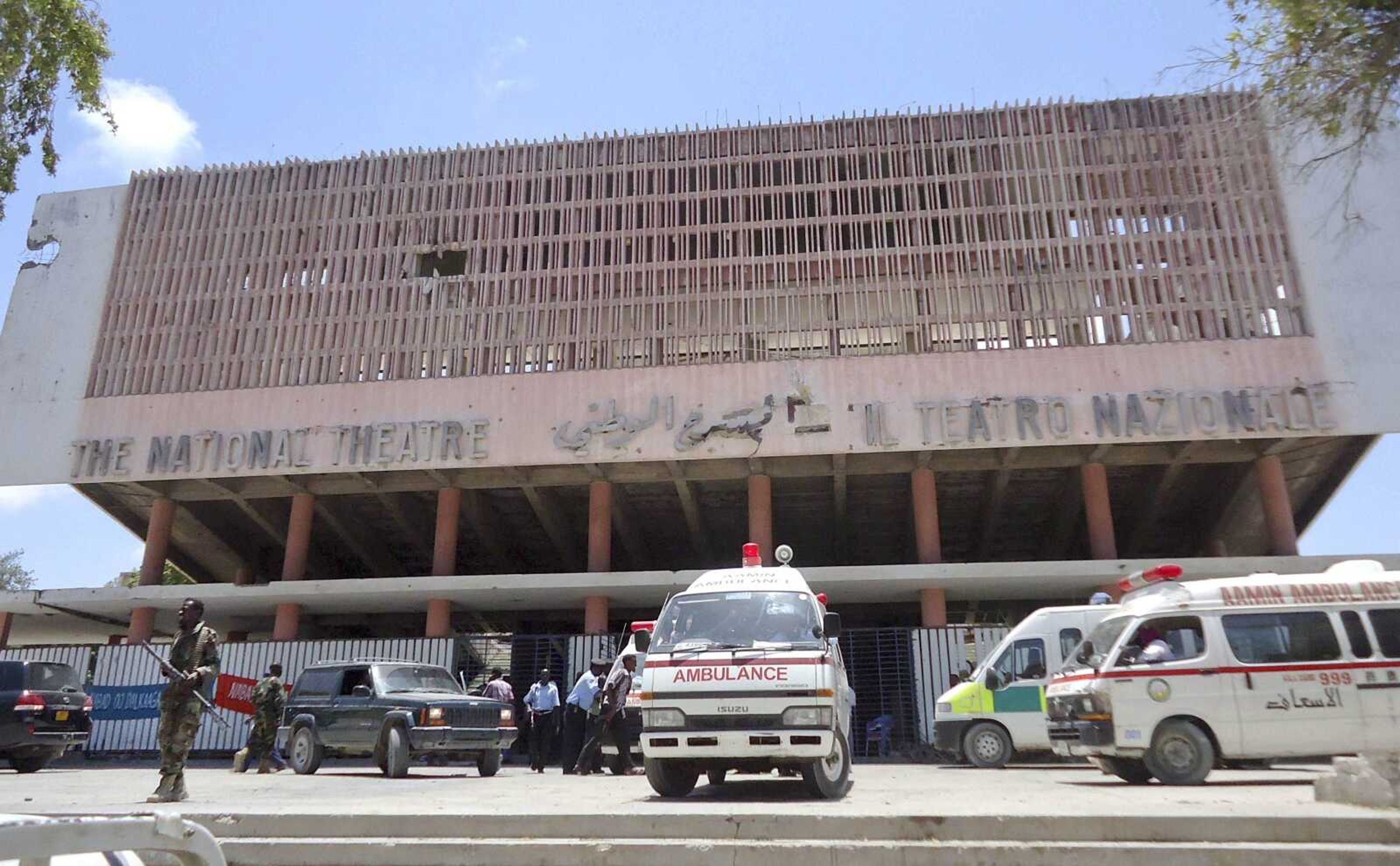Somali theater bombing kills 10
MOGADISHU, Somalia -- Two weeks ago, Somalia's National Theater reopened for the first time in 20 years for a concert that drew an audience in festive colors in a city trying to rise above war. A welcoming banner proclaimed: "The country is being rebuilt."...
MOGADISHU, Somalia -- Two weeks ago, Somalia's National Theater reopened for the first time in 20 years for a concert that drew an audience in festive colors in a city trying to rise above war. A welcoming banner proclaimed: "The country is being rebuilt."
On Wednesday, the theater was turned into a scene of screams, chaos and blood when a suicide bomber attacked another high-profile event, killing 10 people, wounding dozens and shattering a tentative peace in the capital of Mogadishu.
The blast occurred as Prime Minister Abdiweli Mohamed Ali stood at the podium to deliver a speech. He was unharmed, said government spokesman Abdirahman Omar Osman, but the president of Somalia's Olympic committee and the head of its soccer federation were among the dead.
The government said a female suicide bomber carried out the attack. The Islamist militant group al-Shabab used its official Twitter feed to claim responsibility for the bombing.
The al-Qaida-linked organization said explosives had been planted in the theater before the event, but an Associated Press journalist at the scene said there was no large blast crater, making a suicide bombing more likely.
"It was a cowardly act and that will not deter the government from performing its national duties," Osman said. "The prime minister will energize the government to eliminate the terrorists."
Fighters belonging to al-Shabab were pushed out of Mogadishu in August by government and African Union troops after two decades of violence that have gripped the Somali capital.
Since then, sports leagues have blossomed, markets have appeared and Western-style restaurants have sprung up, marking a long-awaited revival of the seaside capital. The National Theater was refurbished and reopened with a concert of singing, guitar-playing and drums March 19 that drew hundreds of people and was broadcast live on TV.
Wednesday's ceremony was part of that rebirth of entertainment, celebrating the first anniversary of the start of a national TV station.
"The blast happened as musicians were singing and spectators were clapping for them," said Salah Jimale, who attended but received only scratches from the bombing. "Huge smoke made the whole scene go dark."
Amid the screams, nervous soldiers outside fired into the air to disperse crowds gathered around the theater.
A man wounded in the head and chest tried to sit up but suddenly collapsed and died. Shoes and blood-splattered cellphones were scattered on the floor of the theater, which can accommodate 2,000 people and is partly open to the sky.
An old woman in tears ran toward a policeman, saying: "My son was in there."
The policeman stopped her. She sat down and cried, but later ran inside, where she learned her son had died.
Ali Muse, the head of Mogadishu's ambulance service who provided the death toll, said the wounded included the national planning minister.
At a nearby hospital, nurses led stumbling patients into operating rooms.
Reporters Without Borders said seven Somali journalists were among the wounded.
"Despite claims that Mogadishu is safer with the ousting of al-Shabab, the challenges and dangers Somali journalists face in the capital are still very prevalent," said Tom Rhodes of the Committee to Protect Journalists.
The International Olympic Committee said it was shocked by the attack that killed Aden Yabarow Wiish, the president of the Somali Olympic Committee, and Said Mohamed Nur, head of the Somali Football Federation.
"Both men were engaged in improving the lives of Somalian people through sport and we strongly condemn such an act of barbarism," the IOC said. "Our thoughts are with the Somalian sporting community who lost two great leaders, and with the families of the victims."
British Prime Minister David Cameron called the bombing "sickening" and acknowledged the "difficult moment" for everyone involved with Somalia's Olympics efforts.
He said he hoped Somalis would honor the memory of those killed by participating in London Olympics this summer.
"At the London Conference on Somalia in February, the international community came together to back the efforts of the Somali people in building a new future for their country. So let us be absolutely clear today. Terrorists and violent extremists have no part in that future," Cameron said.
"And we will not allow their actions to destabilize the process of political reform through which ordinary Somalis are, for the first time, getting a real say in how their country is run."
The revival of sports in Mogadishu is an important part of its transformation. Women who lived under harsh rules when al-Shabab held sway can watch sports and even participate. Al-Shabab defectors have put down their guns and are participating in sports leagues.
Despite the advances, al-Shabab has continued to carry out bombings, sometimes with devastating effect. In October, militants detonated a truck bomb outside a government ministry, killing more than 100 people.
Augustine Mahiga, the U.N. special representative to Somalia, said Wednesday's bombing must not derail Somalia's progress.
"The reopening of the National Theater is symbolic of the real change that is happening in Somalia," Mahiga said in a statement. "The city is being rebuilt, culture is being revived and hope is being restored."
------
Straziuso contributed from Nairobi, Kenya.
Connect with the Southeast Missourian Newsroom:
For corrections to this story or other insights for the editor, click here. To submit a letter to the editor, click here. To learn about the Southeast Missourian’s AI Policy, click here.









